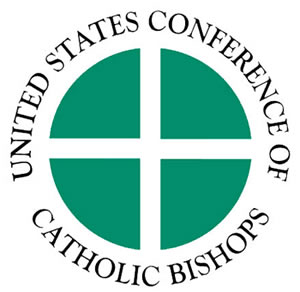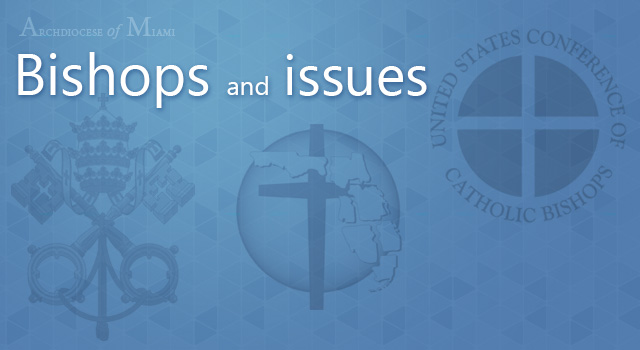By US Conference of Catholic Bishops -
Bishops condemn ‘human exploitation’ that led to tractor trailer deaths
WASHINGTON | Bishop Joe S. Vásquez of Austin, Texas, chair of the U.S. Conference of Catholic Bishops’ (USCCB) Committee on Migration, has issued the following statement on San Antonio law enforcement’s identification of a tractor trailer containing 39 people, including 10 individuals who died due to heat exposure and asphyxiation:
“My brother bishops and I are heartbroken by the news coming from San Antonio regarding individuals found dead in a crowded and overheated tractor trailer. I also note our continued concern and prayers for the several other individuals identified, including school-aged children, who are reported to have life-threatening injuries. The loss of lives is tragic and avoidable. We condemn this terrible human exploitation that occurred and continues to happen in our country. In a moment such as this, we reflect upon the words of the Holy Father, Pope Francis, ‘The defense of human beings knows no barriers: we are all united wanting to ensure a dignified life for every man, woman and child who is forced to abandon his or her own land.’ We together mourn for the lives lost and offer our prayers for these individuals and their families.”
Bishops urge more reasonable approach on health care
WASHINGTON | In light of uncertainty about how the Senate will proceed on health care in the coming days, Bishop Frank J. Dewane of Venice, Florida, chairman of the U.S. Bishops’ Committee on Domestic Justice and Human Development, called on the Senate to fix problems with the Affordable Care Act (ACA) in a more narrow way, rather than repeal it without an adequate replacement.

“Before any legislation had been proposed, the bishops were clear that a repeal of key provisions of the Affordable Care Act ought not be undertaken without the concurrent passage of a replacement plan that ensures access to adequate health care for the millions of people who now rely upon it for their wellbeing,” Bishop Dewane wrote in a July 20 letter to the full Senate. “To end coverage for those who struggle every day without an adequate alternative in place would be devastating.”
The Senate has been discussing various approaches for health care reform, including an ACA repeal approach that does not immediately decide upon a replacement plan.
“The American Health Care Act legislation from the U.S. House of Representatives and the Better Care Reconciliation Act from the Senate were seriously flawed, and would have harmed those most in need in unacceptable ways. In the face of difficulties passing these proposals, the appropriate response is not to create greater uncertainty, especially for those who can bear it least, by repealing the ACA without a replacement.”
Bishop Dewane urged Congress “to address the ACA’s moral deficiencies and challenges with long-term sustainability” by “more narrow reforms, and in a bipartisan way.”
Included in this would be extending full Hyde Amendment protections to the ACA, enacting laws that protect the conscience rights of all stakeholders in health care, protecting religious freedom, and passing legislation that begins to address barriers to access and affordability for the poor.
The full letter can be found here.
House budget resolution said to place poor ‘in jeopardy’
WASHINGTON | Bishop Frank J. Dewane of Venice, Florida, chairman of the U.S. Bishops’ Committee on Domestic Justice and Human Development, has expressed concern over the proposed U.S. House of Representatives budget resolution, which was voted out of committee July 19.
“The USCCB is closely monitoring the budget and appropriations process in Congress and is analyzing the proposed House budget resolution in more detail. It is clearly noted at the outset that the proposal assumes the harmful and unacceptable cuts to Medicaid from the American Health Care Act. Additionally, steady increases to military spending in the resolution are made possible by cutting critical resources for those in need over time, including potentially from important programs like SNAP that provide essential nutrition to millions of people. The bipartisan approach to discretionary spending in recent years, while imperfect, reflected a more balanced compromise given competing priorities.
“A nation’s budget is a moral document. Reducing deficits through cuts for human needs � while simultaneously attempting a tax cut, as this proposal does � will place millions of poor and vulnerable people in real jeopardy. Congress should choose a better path, one that honors those struggling in our country.”
Previous letters from the USCCB on the federal budget can be found here.
Bishops call for permanent protection for DACA youth
WASHINGTON | Over 750,000 youth have received protection from Deferred Action for Childhood Arrivals (DACA) since its inception by the Department of Homeland Security (DHS) in 2012. While DACA provides no legal status, it does provide recipients with a temporary reprieve from deportation and employment authorization for legal work opportunities in the United States.
In response to the recent petition to the U.S. Department of Justice to terminate DACA, Bishop Joe S. Vásquez, Chair of the Migration Committee and Bishop of Austin, Texas, expressed support for DACA once again, stating:
“The Catholic Bishops have long supported DACA youth and continue to do so. DACA youth are contributors to our economy, veterans of our military, academic standouts in our universities, and leaders in our parishes. These young people entered the U.S. as children and know America as their only home. The dignity of every human being, particularly that of our children and youth, must be protected.
“I urge the Administration to continue administering the DACA program and to publicly ensure that DACA youth are not priorities for deportation.
“However, DACA is not a permanent solution; for this reason, I also call on Congress to work in an expeditious and bipartisan manner to find a legislative solution for DACA youth as soon as possible. My brother bishops and I pledge continuing efforts to help find a humane and permanent resolution that protects DACA youth. Additionally, I note the moral urgency for comprehensive immigration reform that is just and compassionate. The bishops will advocate for these reforms as we truly believe they will advance the common good.
“Lastly, to DACA youth and their families, please know that the Catholic Church stands in solidarity with you. We recognize your intrinsic value as children of God. We understand the anxiety and fear you face and we appreciate and applaud the daily contributions you make with your families, to local communities and parishes, and to our country. We support you on your journey to reach your God-given potential.”
Interfaith leaders: Israeli-Palestinian peace still possible
WASHINGTON�In a letter to President Donald J. Trump, 35 Jewish, Christian and Muslim national religious leaders agree that Israeli-Palestinian peace is possible.
They believe, “based on the legitimate, long-standing aspirations of Israelis and Palestinians for national self-determination and security, a two-state solution still represents the most realistic way to meet essential interests of both peoples and to resolve the conflict.”
The letter includes the signatures of Bishop Oscar Cantú, of Las Cruces, chairman of the U.S. bishops’ Committee on International Justice and Peace, and Cardinal Theodore McCarrick, Archbishop Emeritus of Washington.
The statement by Christian, Jewish and Muslim religious leaders points to the fact that, “despite deep distrust on both sides, recent polls among Israelis and Palestinians show that the majority still yearn for two states.” The leaders believe, “pursing either side’s version of a one-state solution would likely lead to more years of violent conflict.”
The leaders are encouraged that, building on years of official and informal negotiations between Israelis and Palestinians, “the basic parameters of a framework for a two-state solution are widely known.” And they say, “combined with a broader regional framework such as the Arab Peace Initiative, the incentives for all sides to make the historic decision for a two-state peace agreement are monumental.”
The full letter can be found here.

